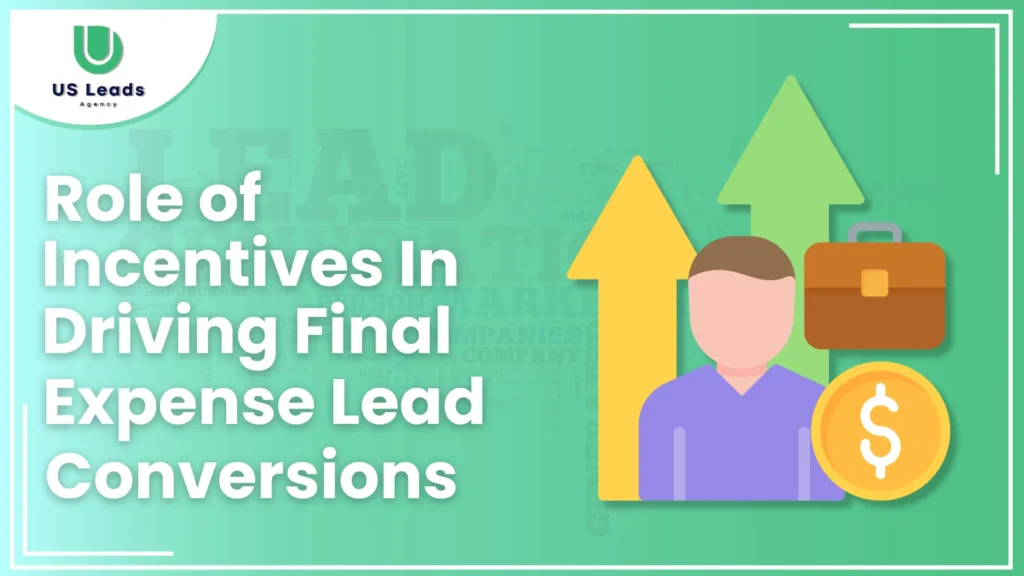
Final expense insurance alleviates the financial burden of funeral and burial costs, offering families peace of mind. In an increasingly competitive market, companies must adopt innovative strategies to differentiate themselves. One of the most effective approaches is incorporating tailored incentives into marketing campaigns. From attracting prospects to encouraging immediate action, incentives play a pivotal role in final expense lead conversions.
This guide explores role of incentives in final expense lead conversions and provides actionable strategies to optimize their use.
Key Takeaways:
- Incentives help companies stand out in a crowded market, attract leads, and build trust.
- Tailored incentives, like senior discounts, appeal to specific audiences and drive conversions.
- Transparency in offers fosters trust, avoiding reputational risks.
- Track metrics like conversion rates and cost per lead to optimize campaigns.
- Align incentives with goals, such as educational resources for awareness or discounts for immediate action.
Table of Contents
Understanding Final Expense Lead Generation:
Final expense insurance caters to seniors, helping them protect loved ones from unexpected costs. The lead generation process involves identifying and engaging potential customers. Barriers such as lack of trust, urgency, or awareness often slow conversions. Incentives effectively address these challenges, becoming a vital part of successful campaigns.
Role of Incentives In Final Expense Lead Conversions:
1. Attracting Attention In a Crowded Market:
Incentives like free funeral planning guides or gift cards capture attention by offering immediate value. These offers draw prospects into the funnel, distinguishing brands in a competitive landscape.
2. Building Trust and Rapport:
Low-pressure incentives, such as free quotes or webinars, create a sense of sincerity. These strategies alleviate concerns about pushy sales tactics and establish trust.
3. Encouraging Immediate Action:
Time-sensitive offers like limited-time discounts create urgency. By leveraging psychological triggers such as FOMO (Fear of Missing Out), companies can prompt quick decision-making.
4. Providing Tangible Value:
Tailored incentives, like bundled health screenings or exclusive resources for seniors, add practical value, fostering goodwill and demonstrating genuine care.
Types of Effective Incentives:
Financial Incentives:
- Premium discounts
- Gift cards for referrals
- Waived application fees
Educational Incentives:
- Free funeral planning webinars
- Personalized insurance recommendations
- eBooks on final expense benefits
Experiential Incentives:
- Complementary health screenings
- Free access to senior wellness events
- Membership to community resources
Best Practices For Using Incentives:
- Understand Your Audience: Research your audience’s preferences. Seniors might favor practical discounts, while caregivers may value educational resources.
- Align Incentives with Goals: Ensure your offers align with campaign objectives. For instance, educational webinars are ideal for lead nurturing, while discounts encourage immediate sales.
- Maintain Transparency: Clearly communicate the terms and conditions of your incentives to build trust and avoid misunderstandings.
- Track and Optimize Performance: Use metrics such as cost per lead and conversion rates to identify the most effective strategies and refine your campaigns.
Conclusion – Role of Incentives In Final Expense Lead Conversions:
Incentives are a transformative tool for final expense lead generation. By aligning offers with audience needs and campaign objectives, businesses can achieve higher conversion rates and ROI. As final expense insurance gains prominence, effective incentive strategies will remain critical to thriving in this competitive landscape.
FAQs:
How do incentives improve lead conversions?
Incentives capture attention, establish trust, and encourage immediate action by creating urgency and adding value.
Are financial incentives more effective than educational ones?
It depends on the target audience. Financial incentives drive immediate decisions, while educational ones build long-term trust.
How can companies measure the success of their incentive campaigns?
Key metrics include cost per lead, conversion rates, and customer lifetime value.
What should companies avoid when using incentives?
Avoid unclear or misleading offers. Transparency is essential to maintain trust and credibility.
How to get final expense leads effectively?
Combine incentives with targeted strategies, such as Facebook ads, telesales, and pre-set appointments, to attract and convert quality leads.
